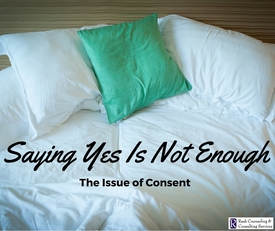 Have you had chance to talk to your teen about the definition of consent for sexual activity? If so, what did you learn? If not, what is keeping you from asking? In case you missed it, check out part one of this post to learn more: The #1 Parenting Mistake You Don't Know You're Making. When I ask teen clients about what consenting to sex means, I typically get one of two answers.
The truth is, simply saying yes to sex is not enough. Making an assumption that you know what the other person wants is definitely not enough. Keep reading to learn more about all of the aspects of giving true, informed consent to sexual activity.*
Now is the time to start talking with your teen about consent. If you don’t, who will? *This blog post is meant to be purely informational. The writer is not able to provide legal advice or instruction in anyway. Questions about specific examples will not be answered in the comments. Please contact an attorney if you have questions or concerns. Bethany Raab is a Licensed Clinical Social Worker in Denver, Colorado.
She is dedicated to helping teens and families be happy and healthy!  If you are like many parents, you are starkly aware of your imperfections when it comes to raising your children. You may have looked at this article with a combination of curiosity and dread. Rest easy. I am not here to tell you what you’re doing wrong – you don’t need that from me. What I do want to talk about is an issue many parents avoid addressing with their children. As kids grow, they become increasingly aware of their own bodies. They also pay more attention to others’ bodies and the presence of sexual images. These are cues that it is time for the “sex talk.” Some parents choose to let the school tackle sex ed. Other parents venture into this topic themselves. The longer I work with teens, it becomes more and more obvious that one specific issue is consistently left out of their sexual education, whether at home, school or both. The issue of consent. What do you think giving consent for sex entails? What do you think your teen knows about giving consent for sex? Ask them, and then come back to learn more: Saying yes to sex is not enough. Bethany Raab is a Licensed Clinical Social Worker in Denver, Colorado.
She is dedicated to helping teens and families be happy and healthy!  My thoughts on the Duggar family and teens who sexually abuse By now, I’m sure most of you have heard about the Duggar family and the oldest son, Josh’s inappropriate sexual behavior as a teen. I’ve been thinking a great deal about this situation and trying to reserve judgement the best I can as I am not privy to intimate details of the situation. However, I feel compelled to say a few words on the subject. For those of you who are unaware, one of my specialty areas in my therapy practice is working with teenagers who have committed sexual offenses. I have been doing this work for more than five years and have received extensive training in this area. Working with these teens is one of my great passions and an area of therapy that I truly love. I am also passionate about working with people, teens and adults alike, who have been victims of sexual abuse. Often, these two areas of practice intersect. During my nine year social work career and five years of helping teens address inappropriate sexual behaviors I’ve learned countless lessons. Here are four that stand out in light of the Duggar family situation. 1) Sexual abuse is wrong and it is illegal. Sounds obvious, but it is a point worth making. Using statements such as “kids will be kids,” “boys will be boys,” or “they were just playing doctor” is dangerous. These sentiments justify inappropriate behavior and undermine the impact sexual abuse has on its victims. 2) Keeping sexual abuse a secret is harmful to victims and the person perpetrating the abuse. Not only are both parties unable to receive help, but it perpetuates the idea that inappropriate sexual behavior is acceptable in our society. 3) Sexual acting out as a teen does not automatically make you a pedophile. A vast majority of teens I see in treatment who have sexually abused younger children are not sexually attracted to younger children. Sexual acting out by teens is driven by a number of factors including, but not limited to, experiencing sexual or physical abuse themselves, isolation, poor social skills and difficulty connecting with their peers. 4) Therapy works. The type of therapy I practice is called offense specific therapy. It has been specifically developed to help teens who have committed sexual offenses learn about why they committed their offense, help them learn healthy relationship skills and reduce their risk to sexually re-offend. Various studies show that between 87-93% of juveniles who complete this treatment successfully will NOT go on to sexually re-offend. With all of this said, I really don’t know what to tell you about the Duggar family situation. I certainly do not have enough information about what happened to insinuate that I am an expert on the situation. However, I hold firmly to my belief that sexual abuse is wrong and harmful. I also believe that both the victim and the perpetrator in any instance of sexual abuse are deserving of treatment to help them cope with what occurred. Thanks for reading! Please do not hesitate to contact me with comments or questions on this topic. I’d love to hear from you! Bethany Raab is a Licensed Clinical Social Worker in Denver, Colorado.
She is dedicated to helping teens and families be happy and healthy! This week I want to address the second topic covered in my New Years Resolutions blog last month: Sexting. Just to be clear, “sexting” is a combination of the words “sex” and “texting.” It is defined by Urban Dictionary “the act of text messaging someone in the hopes of having a sexual encounter with them later; initially casual, transitioning into highly suggestive and even sexually explicit.” These messages may also include pictures of one self. The Merriam Webster Dictionary includes a similar definition.  It is important for parents and teens to be aware of the risks of sexting behavior. A 2012 study cites states “among girls, the use of sexting behaviors appears to coincide with much higher engagement in risky sex behaviors.” The risk is not limited to teen girls. Did you know that over 75% of teens who are propositioned to have sex via a text, actually end up having sexual intercourse? You are likely already aware of the risks sexual activity including teen pregnancy, contracting HIV or a sexually transmitted disease. Sexting can also have legal ramifications. For example, a teen girl sending a sexually explicit picture of herself to her boyfriend is not illegal (though not a good idea). However, the boyfriend then sharing the picture with one or more people can lead to big problems. This can be considered distribution of child pornography and can carry a prison sentence and the sender being required to register as a sex offender. Psychology Today published an article about the legal concerns with sexting. Here are some suggestions for parents:
Image from Flickr. Some rights reserved by Jhaymesisviphotography. Bethany Raab is a Licensed Clinical Social Worker in Denver, Colorado.
|
Welcome!
Every blog post you see on this page is written especially for teens and their parents! Like it? Pin it!
Follow me!
Categories
All
|

 RSS Feed
RSS Feed